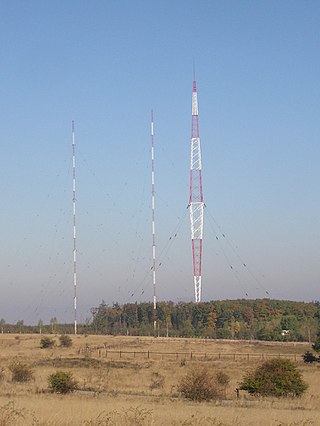The Internet in Bulgaria began to offer full TCP/IP services in 1992, although e-mail, network news, and some other Internet services were available earlier, during the period from 1989 to 1991. The .bg top-level domain name was organized in 1991. [1] Internet speeds and connection reliability in the capital, Sofia, are consistently ranked among the fastest in the world by several independent studies.
Local area network (LAN) is the most common type of Internet access in Bulgaria. Over 60% of the consumers use this type of access because of the high speeds and good service. The biggest Internet service providers (ISPs) offer fiber optic access, called fiber-to-the-building (FTTB). This type of Internet access supports a variety of services, which are offered by most ISPs: IPTV, VoIP, and Video on demand (VOD). The major ISPs have networks in the following cities: Sofia, Plovdiv, Burgas, Varna, Veliko Tarnovo, Lovech, Ruse and Blagoevgrad.[ citation needed ]
Asymmetric digital subscriber line (ADSL) technology was introduced in Bulgaria after the privatisation of the state monopoly Bulgarian Telecommunications Company (BTC) in 2004. Since then, availability has greatly increased and as of February 2006 it was offered in 140 towns and villages around the country. With the liberalisation of the telecommunications market, it is expected that other companies currently offering broadband Internet by other means will begin offering ADSL. At the end of 2006 the service was available to customers in 208 towns and villages.[ citation needed ]
There are no government restrictions on access to the Internet or reports that the government monitors e-mail or Internet chat rooms without appropriate legal authority. [9]
The law provides for freedom of speech and press, and the government generally respects these rights. The penal code provides for from one to four years' imprisonment for incitement to "hate speech." The law defines hate speech as speech that instigates hatred, discrimination, or violence based on race, ethnicity, nationality, religion, sexual orientation, marital or social status, or disability. Internet social networks have become increasingly popular with anti-Semitic groups. Web site administrators were deleting anti-Semitic comments under online media articles, but gradually stopped the practice. [9]
The constitution and law prohibit arbitrary interference with privacy, family, home, or correspondence, and the government generally respects these provisions in practice. The security services can access electronic data with judicial permission when investigating cyber and serious crimes. However, NGOs criticise gaps in the law that allow the prosecution service to request such data directly from the service providers without court authorisation. There are no reports that the government attempts to collect personally identifiable information in connection with a person's peaceful expression of political, religious, or ideological opinions or beliefs. [9]
Telecommunications in Botswana include newspapers, radio, television, fixed and mobile telephones, and the Internet.

Telecommunications in Bulgaria include radio, television, fixed and mobile telephones, and the Internet.
Telecommunications in the Dominican Republic include radio, television, fixed and mobile telephones, and the Internet.
This article provides an overview of telecommunications in Lithuania, including radio, television, telephones, and the Internet.
Telecommunications in North Macedonia include radio, television, fixed and mobile telephones, telegraph and the Internet.
Telecommunications in Eswatini includes radio, television, fixed and mobile telephones, and the Internet.
Telecommunications in Trinidad and Tobago include radio, television, fixed and mobile telephones, and the Internet.
Telecommunications in Zambia includes radio, television, fixed and mobile telephones, and the Internet.
This article concerns the systems of telecommunication in Austria. Austria has a highly developed and efficient telephone network, and has a number of radio and television broadcast stations.
Telecommunications in Belize include radio, television, fixed and mobile telephones, and the Internet.
Telecommunications in Montenegro includes radio, television, fixed and mobile telephones, and the Internet.
Belgium has well-developed Internet infrastructure, ranking among the top countries in the world in terms of total number of Internet users, fixed broadband users, mobile broadband users, and Internet hosts. Providers typically offer download speeds of 30Mbit/s to 1Gbit/s, and upload speeds of 10Mbit/s to 75Mbit/s. Historically, Belgian Internet providers have imposed data caps on their subscribers, but lately this practice has been disappearing as Belgian Internet infrastructure has expanded.
The Internet in Croatia became a reality in November 1992 when the first international connection linking Zagreb and Vienna became operational.
The Internet in Portugal achieved a penetration rate of about 64% of the population in 2012. With an average peak Internet access speed of 34.5 megabits per second, Portugal stood seventeenth on the list of countries with the fastest Internet access.
The Internet in Poland was used by 90.4% of households in the country and 98.6% business entities in 2020. In 2023 93.3% household have internet access. 69.5% using fixed broadband, 73,7% using mobile broadband
The Internet in Sweden was used by 94.0% of the population, the fourth highest usage rate in the world, behind only the Falkland Islands (96.9%), Iceland (96.0%), and Norway (95%) in 2015. Sweden ranks 18th and 5th highest in the world in terms of the percentage of its fixed and wireless broadband subscriptions. It has the second fastest average internet connection speed in the world.
The Internet in Botswana is used by approximately 87.2% of the population, as of 2023. There has been a massive increase in internet users since 2013 when only 30% of the population of Botswana was found to use the internet. This is notably higher than the percentage of internet users in Africa as a whole, which is around 43%. For reference, in 2023, the global statistic for internet users is 66%.
Telecommunications in Ivory Coast include radio, television, fixed and mobile telephones, and the Internet.
Telecommunications in Costa Rica include radio, television, fixed and mobile telephones, and the Internet.
Telecommunications in Cyprus includes radio, television, fixed and mobile telephones, and the Internet, in the Republic of Cyprus.